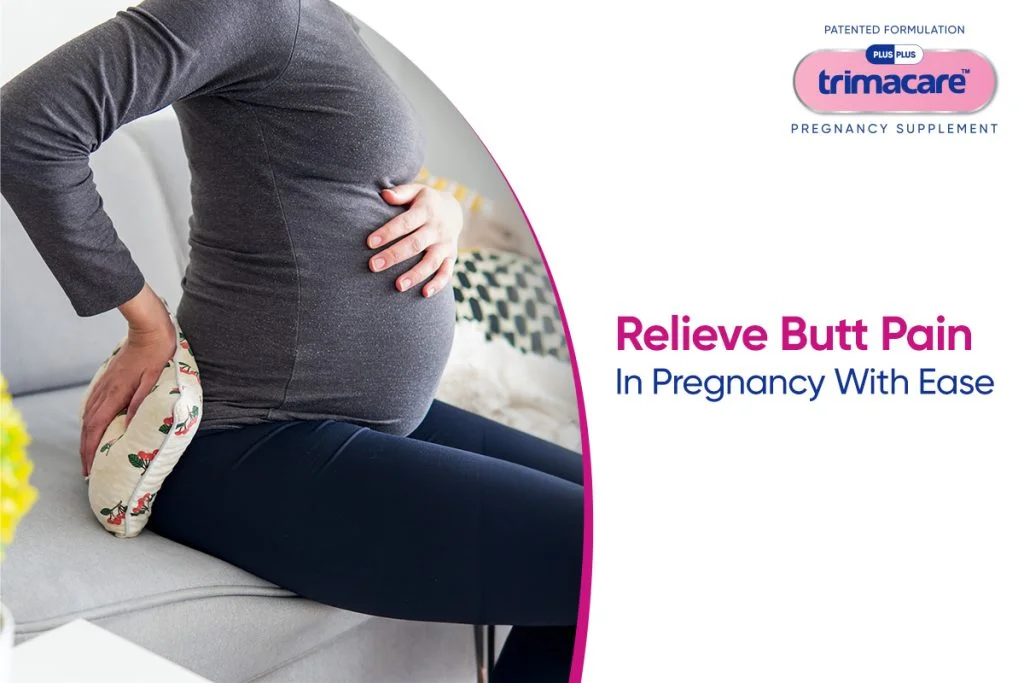During the third trimester, you will experience rapid changes in your body as your baby is ready to come out. In addition to these changes, you would be experiencing several discomforts such as butt pain during pregnancy. This blog aims to give you insight and tips to help manage pain in buttocks during pregnancy. buttock pain while pregnant are not so common and are caused by many factors, including posture change, increased pressure on pelvic and hormonal changes.
Common Causes of Pain in Buttock during Third Trimester
- Sciatica: Compression of the sciatic nerve, which runs from the lower back to the legs, can cause pain in buttocks during pregnancy in the lower back and legs.
- Pelvic Girdle Pain (PGP): PGP IS referred to as SPD, which is short for symphysis pubis dysfunction. PGP is a condition that causes pain in the pelvic region, including buttocks, as a result of increased pressure on the pelvic joints.
- Posture Changes: During pregnancy, your centre of gravity changes as the baby grows, which may alter your posture and pressure the buttocks muscle of the lower back.
- Pressure on Nerves: The enlarging uterus may obstruct some nerves and cause bum pain during pregnancy.
- Ligament Stretching: Pregnancy hormones cause the ligaments to stretch and lead to discomfort along the buttocks and the pelvic region.
Tips for Managing Buttock Pain in Pregnancy:
If the butt pain during pregnancy is severe and persistent or accompanied by other alarming symptoms, it is necessary to talk to your doctor. He may be able to evaluate the cause of pregnancy butt pain and provide recommendations and treatment plans based on specific needs.
- Prenatal Exercise: Engage in gentle prenatal exercises that strengthen the muscles supporting your pelvis and lower back.
- Posture Awareness: Be mindful of your posture when standing, walking, and sitting. Use cushions or pillows for support when sitting for a long time.
- Change Positions Regularly: Do not sit or keep standing for too long. Change your position and have several breaks to relieve pressure off the buttocks.
- Warm bath: Taking a warm bath is one of the things that give relaxation and ease the tension of the muscles within the buttocks.
- Supportive Clothing / Supportive Pillow: Use maternity belts or bands to provide support and shift the weight of the baby across your pelvis and buttocks. Use a pregnancy pillow or cushion if you must sit for hours at a stretch. This would ease the pressure off your buttocks and lower back.
- Rest and Sleep: Provided that you are receiving enough sleep and rest. This will help the body to recover and get adjusted to a nice sleeping position, use pillows in support.
Stretching: Gentle stretches like pelvic tilts and cat-cow stretches may alleviate tension in muscles and increase flexibility. - Consult Your Doctor: If pain does not subside, or even aggravates, it is advisable to seek medical opinion from your doctor for proper assessment and guidance. Doctors may also recommend physical therapy or other forms of interventions.
Trimacare – The Best Source of Essential Multivitamins During Pregnancy
During these changes in body, the best health of the pregnant woman is needed. Trimacare Prenatal Tablets unique trimester wise course guarantees that the nutrient requirements of different trimesters are fulfilled, ensuring the mother and baby’s health. Trimacare pregnancy multivitamins include 20+ essential nutrients including iron, folate, calcium, omega-3 fatty acids, and Vitamin D. These nutrients defend against pregnancy-related disorders like osteoporosis or anaemia in the future.
Trimacare prenatal pills enhance pregnancy outcomes as they help to prevent the foetus from getting foetal complications such as IUGR, ADHD, low birth weight, stillbirth and preterm birth.
Trimacare prenatal multivitamins are developed by a team of doctors, pharmacologists and nutritionists within a GPM-certified facility using high-grade components, free from GMOs, hence highly qualified and reliable.
Conclusion-
pregnancy pain buttocks is prevalent during the third trimester of pregnancy. Maintaining good posture, engaging in regular exercise, and seeking support from doctors can effectively manage discomfort and promote relief.
Frequently Asked Questions:
1. What causes buttocks pain during the third trimester of pregnancy?
These changes in hormones, increased pressure on the pelvic area and positioning of the baby that puts a strain on the sciatic nerve can all be contributing factors during the third trimester of pregnancy.
- How to ease buttock pain during the third trimester of pregnancy?
You can attempt some gentle exercises such as prenatal yoga, apply heat or cold packs to the region, maintain good postures, and attempt regular prenatal massages to relieve buttock pains in the third trimester of pregnancy. - Is it normal to have buttock pain during pregnancy?
Indeed, experiencing pain in the buttocks during pregnancy, especially in the third trimester, is normal due to the changes happening in the body and the pressure exerted by the growing uterus on the surrounding muscles and nerves. - When should I be worried about buttock pain during pregnancy?
Buttock pain should concern a pregnant woman if it becomes severe, accompanied by other symptoms such as numbness or tingling in the legs, or if she has problems standing or walking. Such instances prompt consultation with a doctor. - Can I self-medicate with over-the-counter medication to ease buttock pain during pregnancy?
During pregnancy, it is best to avoid over-the-counter pain relievers since most of them may not be safe for you or your baby. Try out alternative treatments such as physical therapy and prenatal chiropractic care or ask your doctor what is safe for pain relief.
A Certified Nutritionist with a rich healthcare background in health journalism, the author has immense experience in curating reader-friendly, engaging, and informative healthcare blogs to empower readers to make informed pregnancy-related decisions.













